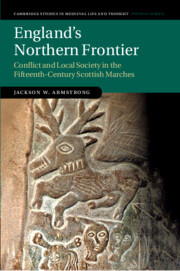Description
England's Northern Frontier
Conflict and Local Society in the Fifteenth-Century Scottish Marches
Cambridge Studies in Medieval Life and Thought: Fourth Series
Author: Armstrong Jackson W.
Explains the history of England's northern borderlands in the fifteenth century within a broader social, political and European context.
Language: English
Subject for England's Northern Frontier:
Approximative price 32.87 €
In Print (Delivery period: 14 days).
Add to cart
England's Northern Frontier
Publication date: 12-2021
Support: Print on demand
Publication date: 12-2021
Support: Print on demand
Approximative price 121.50 €
In Print (Delivery period: 14 days).
Add to cart
England's Northern Frontier
Publication date: 11-2020
414 p. · 16x24 cm · Hardback
Publication date: 11-2020
414 p. · 16x24 cm · Hardback
Description
/li>Contents
/li>Biography
/li>
The three counties of England's northern borderlands have long had a reputation as an exceptional and peripheral region within the medieval kingdom, preoccupied with local turbulence as a result of the proximity of a hostile frontier with Scotland. Yet, in the fifteenth century, open war was an infrequent occurrence in a region which is much better understood by historians of fourteenth-century Anglo-Scottish conflict, or of Tudor responses to the so-called 'border reivers'. This first book-length study of England's far north in the fifteenth century addresses conflict, kinship, lordship, law, justice, and governance in this dynamic region. It traces the norms and behaviours by which local society sought to manage conflict, arguing that common law and march law were only parts of a mixed framework which included aspects of 'feud' as it is understood in a wider European context. Addressing the counties of Northumberland, Cumberland and Westmorland together, Jackson W. Armstrong transcends an east-west division in the region's historiography and challenges the prevailing understanding of conflict in late medieval England, setting the region within a wider comparative framework.
1. Introduction; Part I: 2. Frontiers and borderlands; 3. Earth and stone; Part II: 4. The nobility, gentry and religious houses; 5. Lordship, kinship and the surnames; Part III: 6. The administration of justice; 7. Patterns of conflict; 8. Cross-Border conflict; 9. Discord; 10. Concord; 11. Conclusions; Bibliography; Index.
Jackson W. Armstrong is Senior Lecturer in History at the University of Aberdeen, where he specialises in late medieval Scottish and English history. He has led two major funded projects concerned with Scotland's earliest and most complete body of legal and town records, the UNESCO-designated Aberdeen council registers. Armstrong has previously served as book reviews editor for the Scottish Historical Review and as a trustee of the Society of Antiquaries of Scotland.
© 2024 LAVOISIER S.A.S.
These books may interest you

The Northern Counties from AD 1000 142.04 €



